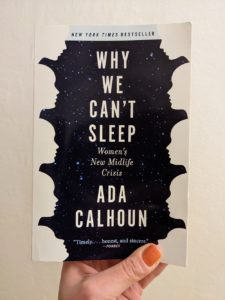Why We Can’t Sleep by Ada Calhoun
Written by Ashley Kelmore, Posted in Reviews
Best for:
Women at the start of their midlife.
In a nutshell:
Author Calhoun explores the unique challenges that Gen X women are facing as they enter and continue through midlife.
Worth quoting:
“But Gen Xers entered life with ‘having it all’ not as a bright new option but as a mandatory social condition.”
“The last think we need at this stage of life is self-help…What we need at this stage isn’t more advice, but solace.”
Why I chose it:
Well, by most accounts I am Gen X. I’m in my 40s. And things are getting fucking hard.
How it left me feeling:
Seen
Review:
Without getting into too much detail, my visit to see my parents over New Year was stressful in a new way. They are in their 70s, and with that comes some of the expected challenges. I live about 6,000 miles from them, and my sibling lives about 3,000 miles from them, so that’s something else added into the mix. During a quick outing one day, my partner and I popped into a bookstore and this book damn near jumped off the shelves into my hand.
Calhoun looks at so many different aspects of what life is like for middle-aged Gen Xers, and I appreciate that she’s clear that it isn’t all bad. There is a lot that we have going well for us, but there are a lot of issues that she argues are unique to our generation – that won’t impact Millenials the same way, for example. A lot of the focus is on how the expectations have not matched reality, and she argues that Millenials don’t have the same types of expectations, which on the one hand, bummer, but on the other hand, allows them to age with a more realistic outlook on what is reasonable to expect out of life.
The book could feel defeatist in the hands of a less talented author, but the way Calhoun shares the stories of those she has interviewed, and mixes it with her research into what middle-aged women are experiencing, makes it feel more hopeful (in a realistic way). She shares some of her own stories too, but the focus is on other women and how they’re navigating the discrepancy between what they thought their life would be (and what society has told them it SHOULD be), and what it actually is. She doesn’t provide a bunch of tips or solutions, save the big one, which is to adjust one’s expectations. That sounds like a total bummer reading it in just this tiny review, but in the context of the book? It felt pretty great to read.
The only area that rubbed me the wrong way was the choice she made to heavily quote from a male ‘expert’ when talking about divorce. That guy had some … interesting takes. I’m still baffled as to why it was included.
Calhoun interviewed over 200 women across demographics to inform this book, though she shares that it is primarily focused on middle-class women because, “Very poor women in this country bear additional burdens that are beyond the scope of a book this size. Very rich women have plenty of reality TV shows about them already.” So the reader knows that, like, obviously the women this book is aimed at will have different challenges than people who have very little money. I appreciate that the book doesn’t try to be all things to all women, and I also appreciate that within the economic boundaries she set, the author spoke to women of different races, sexualities, and career fields, along with women who are partnered, single, have children, and don’t.
Recommend to a Friend / Keep / Donate it / Toss it:
Keep and recommend to friends by age.

